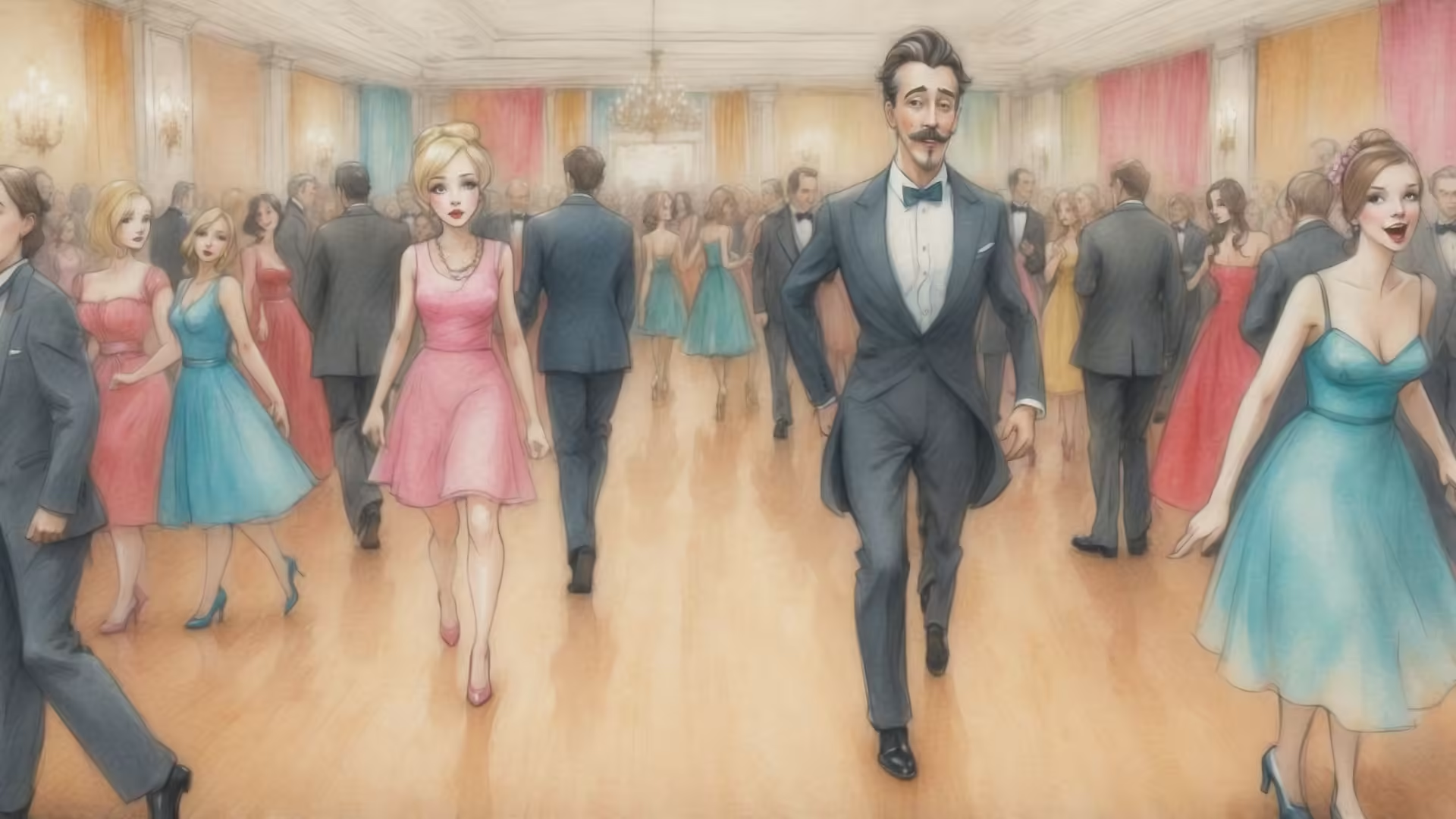The Gist
What Does Gauche Mean?
The word “gauche” is used to describe someone who is socially awkward or lacking in finesse. It often refers to behavior that feels clumsy or out of place in a social context, like saying something inappropriate at the wrong moment or not picking up on subtle cues. The term comes from French, where it originally meant “left” but evolved to suggest awkwardness—since left-handedness was once associated with clumsiness and unconventional behavior.
Gauche vs. Tactless: What’s the Difference?
While “gauche” and “tactless” are related, they carry slightly different meanings. Tactless behavior refers to saying or doing something without considering how it might affect others, often causing offense. Gauche behavior, on the other hand, isn’t necessarily intended to offend—it’s more about lacking social polish or grace. Think of it this way: someone tactless might make a rude joke at a formal event, while someone gauche might wear sneakers to a black-tie affair, simply unaware of the dress code.
Real-Life Examples of Gauche Behavior
Imagine you’re at a dinner party, and someone loudly asks how much the host paid for their house. That’s a classic example of gauche behavior—socially awkward and inappropriate for the setting. Or think about the coworker who interrupts every meeting without realizing how disruptive they are. These moments stand out not because they’re malicious but because they reveal a lack of social awareness.
How to Avoid Being Gauche
The good news is that gaucheness isn’t a permanent trait. It’s something we can learn to navigate with practice. Being mindful of your surroundings, paying attention to social cues, and observing how others interact can go a long way in avoiding awkward moments. And if you do find yourself in a gauche moment—don’t panic. A little self-awareness and a sincere apology can quickly smooth things over.
When Gauche Behavior Is Forgivable
Not all gauche behavior deserves harsh judgment. In fact, some social settings are more forgiving than others. A casual gathering among friends, for example, might overlook awkward moments more easily than a formal event. And let’s be honest—everyone has their awkward moments. The key is to recognize when it happens, learn from it, and move on without dwelling too much on it.
How to Use Gauche in Conversation
Using the word “gauche” in conversation is a great way to describe awkward social behavior in a nuanced way. For example, you might say, “It was a bit gauche of him to ask about salaries at the wedding,” or “I felt so gauche showing up in jeans when everyone else was dressed up.” The word adds a touch of sophistication to your vocabulary, making it useful for situations where “awkward” just doesn’t quite capture the feeling.
Final Thoughts: Embrace the Learning Curve
Everyone slips up in social situations from time to time—it’s part of being human. The word “gauche” helps us describe those moments when we or others miss the mark, but it’s also a reminder that social grace is something we can learn. If you’ve ever found yourself in a gauche moment, you’re not alone. What matters most is how we handle those situations and the lessons we take from them. So the next time you feel a little out of place, remember: it’s all part of the process.
Let’s Talk
So, let’s get real—have you ever found yourself in one of those painfully awkward moments and thought, “Why did I just say that?” That’s a perfect example of a gauche moment. We’ve all been there. Maybe you asked someone when their baby was due… and they weren’t pregnant. Or you cracked a joke at the wrong time, only to be met with silence and a couple of nervous coughs. Gauche moments sneak up on us when we least expect it, and they usually leave us with a choice—laugh it off or overthink it for the next five years. Sound familiar?
What’s funny about the idea of being gauche is that it’s not about being rude on purpose—it’s more about missing the mark without realizing it. Like when you accidentally wear flip-flops to a formal dinner because you thought it was casual. No one’s angry at you, but the discomfort hangs in the air, and you just want to disappear. Moments like these are a reminder that social norms are trickier than they seem. And honestly, who decided all these unwritten rules in the first place?
What’s interesting is how context plays such a big role in what counts as gauche. For example, asking someone’s salary at work might be completely acceptable in some cultures, but in others, it’s the social equivalent of walking into a room with toilet paper stuck to your shoe. So, being socially smooth isn’t just about memorizing rules—it’s about learning to read the room, which is way easier said than done. Have you ever found yourself in a new place or culture and thought, “Wow, I am totally out of my element”?
Here’s the thing: we tend to get really critical of ourselves when we mess up socially, but these moments are usually more forgivable than we think. If you’ve ever worried that you seemed awkward or out of place, chances are people have forgotten it long before you have. The truth is, most people are too busy worrying about their own faux pas to dwell on yours. So, maybe the real lesson here isn’t to avoid being gauche but to learn how to handle it gracefully when it happens. A sincere “Oops, that was awkward!” can go a long way—and hey, it might even break the ice.
But how do you strike a balance between being socially aware without overanalyzing everything you do? It’s tricky, right? If you think too much about avoiding mistakes, you can come across as stiff or reserved. And that, ironically, can make things even more awkward. Maybe the key is to stay curious and open—to pay attention to social cues but also accept that not every interaction will be perfect. What’s a moment in your life when things went a little sideways socially? And how did you handle it? Did you cringe and replay it in your head a hundred times, or did you let it go?
In the end, moments of social awkwardness remind us that we’re human. And that’s not such a bad thing. It’s okay to miss the mark sometimes—it’s part of learning and growing. So, the next time you feel yourself slipping into a gauche moment, remember: you’re not alone, and it’s probably not as bad as it seems. And who knows? It might even make for a great story later.
Let’s Learn Vocabulary in Context
Talking about gauche moments introduces us to some handy vocabulary that goes beyond just describing social awkwardness. Let’s walk through these words and phrases, see how they were used, and explore how you can slip them into your everyday conversations.
First, there’s gauche itself. It means socially awkward or lacking in tact—those moments when you say or do the wrong thing without meaning to. You could say, “I felt so gauche asking about vacation plans right after someone mentioned a canceled trip.”
Another key word is finesse, which is all about handling situations delicately and with skill. If gauche is about missing the mark, finesse is the art of hitting it just right. For example, “She handled that awkward question with finesse, changing the subject smoothly.”
Tact is closely related. It’s the ability to say or do the right thing without offending anyone. It’s like social grace in action. You might hear someone say, “He broke the bad news with tact, making everyone feel respected.”
We also talked about social cues—those little signals we pick up from people’s behavior or body language that guide how we respond. Ever notice someone looking at their watch during a conversation? That’s a cue it might be time to wrap things up. You might say, “I missed the social cues and kept talking long after everyone else was ready to leave.”
Then there’s grace, which refers to doing something with elegance and ease, even in tricky situations. Handling a social slip-up gracefully can turn a moment around. “She tripped on her way in but recovered with such grace, it almost looked intentional.”
We touched on faux pas, a fancy way of saying a social mistake. It’s one of those words that make awkward moments sound almost elegant. “I made a faux pas by forgetting to introduce myself at the meeting.”
Self-awareness also came up—this is the ability to recognize your own behavior and how it affects others. It’s what keeps you from going full-speed ahead into gauche territory. For example, “His self-awareness made it easy for him to apologize when he realized he’d interrupted.”
Another useful term is context. Social behavior makes sense within certain contexts, but it can feel awkward when taken out of them. Think of how what’s normal at a casual hangout might not fly at a formal event. You might say, “In the right context, that joke would’ve been hilarious.”
We also mentioned navigate, which is about finding your way through something—like a social situation. Navigating conversations with ease takes practice. “She navigated the dinner conversation like a pro, switching topics when things got tense.”
Finally, we can’t forget recover, which is all about bouncing back from mistakes. Social recovery is a skill everyone needs, because let’s face it—things don’t always go smoothly. You might say, “He recovered so well from the awkward silence, it became a funny moment.”
Now, here are a couple of questions to reflect on: What’s a time you had to recover from a social faux pas? And how do you read social cues to avoid being gauche in different situations?










0 Comments